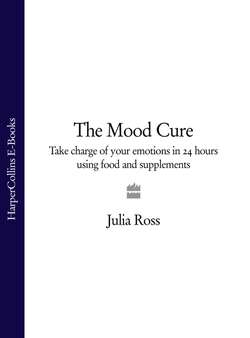Читать книгу The Mood Cure: Take Charge of Your Emotions in 24 Hours Using Food and Supplements - Julia Ross - Страница 31
Where You Might Have Lost Your Serotonin
ОглавлениеIn your diet—if you’re not eating pro-serotonin foods like protein and healthy fat or if you are eating antiserotonin foods such as caffeinated sodas, coffee, or “diet sweetened” drinks or foods.
Under stress—as your brain struggles with overwhelming or chronic demands.
In your genes—if you inherited “false mood” brain programming.
In the evening or in winter—when there’s not enough bright light to signal your brain to make serotonin.
By lack of exercise—when you’ve underestimated the brain-enhancing effect of physical activity.
Few foods contain 5-HTP or serotonin themselves, so everything depends on your getting enough tryptophan from your diet. Where do we get tryptophan? From high-protein food. Unfortunately, tryptophan has been diminishing from our food supply for the past one hundred years, about as long as our rate of depression has been climbing!
Tryptophan is still found in foods like turkey, beef, pork, dairy products, chicken, and eggs; but, in proportion to the other twenty-one aminos that compose protein foods, it is the runt. These foods have three times more of many of the other amino acids than they do of tryptophan. But this wasn’t always so.
Wild game, like the venison our forebears ate, was higher in tryptophan than the meat we eat today. The difference is largely the result of how the animals we eat now are fed themselves. Rather than the grasses and other plants that wild animals grazed on, our modern stockyard animals are fed low-tryptophan grains like corn. This fattens up the animals in record time, but as a result, the meat from these animals is much lower in tryptophan. To compound the problem, we humans have also increased our consumption of low-tryptophan, grain-based carbohydrates like bread, pasta, bagels, cookies, and so on, which has further diminished our access to tryptophan.
If you are a vegetarian, you’re at a greater risk of developing tryptophan malnutrition. Even if you never touch a piece of meat, you do get some tryptophan from foods like nutritional yeast, milk products, nuts, seeds, bananas, and pumpkin. But other than the milk products and yeast (which many vegetarians don’t eat), most vegetarian foods contain much less tryptophan than animal-derived foods do. And that’s important to remember, because decreases in the amount of tryptophan you consume can so easily prevent your brain’s serotonin stores from increasing.
Numerous studies have shown how easy it is to create a serotonin deficiency in depressed people within a few hours simply by feeding them protein shakes that contain the other amino acids but no tryptophan. That’s why skipping meals or eating meals without protein is almost guaranteed to reduce your serotonin-derived happiness. Our clinic recommends a minimum of 4 ounces of a protein food per meal (that is, at least a chicken-breast-size portion three times a day).
Unfortunately, though eating more protein will help, it is no guarantee that you’ll get enough tryptophan into your brain. That’s because of the blood-brain barrier, which protects your brain against the mayhem of nutrients in the bloodstream. It’s a selective filter that allows only so many amino acids to get into the brain at any given time. Because there’s so much less of it to begin with, tryptophan can easily get lost in the shuffle—no matter how badly it’s needed—leaving you serotonin deficient.
You may also have been put at risk of serotonin deficiency from the start by being fed infant formula that did not contain the high human breast milk ratio of tryptophan to other aminos. Breast milk has a higher proportion of tryptophan than either cow’s milk or soy milk. The net result is reduced serotonin in formula-fed babies. Were you one? One study, reported in a book that I recommend to you, The Crazy Makers: How the Food Industry Is Destroying Our Brains and Harming Our Children, focused on sleep and found that supplementing infant formula with tryptophan safely resulted in more and better sleep.
Believe it or not, getting too little healthy fat may be another way in which your diet has contributed to your low serotonin state. Increasing fat intake increases the availability of tryptophan in the brain.2 Did you notice on the Mood-Type Questionnaire that anger and negativity are reliable symptoms of serotonin depletion? Both emotions increase on low-fat diets. A study comparing a 41 percent fat diet with a 25 percent fat diet found that subjects’ moods deteriorated with reduced-fat intake.3
Last, and certainly not least, our fast foods and skipped meals have depleted us of many of the vitamins and minerals that assist in the magical conversion of tryptophan to 5-HTP and then to serotonin. Without enough calcium, magnesium, vitamin D, and B vitamins, for example, the neurotransmitters can’t be made consistently. With so many of us eating far from enough fresh, whole vegetables, fruit, beans, and grains, we’ve become deficient in many mood-crucial nutrients, which is why it is important to eat good-mood foods and take the basic supplements laid out in the master plan in step three.
